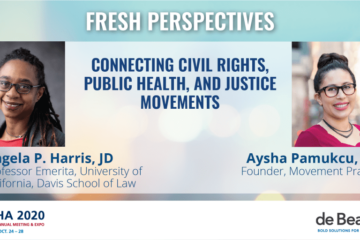BOLD SOLUTION: Creating free, easily accessible resources to help community leaders adopt laws and policies that improve health outcomes. For example, this resource on legal strategies and best practices to advance health equity can be downloaded and used by any community across the country.
Five Questions for Aysha
1. Who or what inspired you to enter the field of public health?
My family is my most direct inspiration. My mom is from the Philippines, my dad is from Turkey, and my sister and I grew up in the San Francisco Bay Area. More than anything, our experiences taught me that health and opportunity are unjustly influenced by who we are and where we live.
2. What is one of the most interesting projects you’ve worked on in public health?
One of the most rewarding aspects of working in the public health field is blending public health approaches and research with other disciplines to produce new ideas and innovation. My background is in civil rights, so I’m very excited about research that I’m producing in partnership with Professor Angela P. Harris called “The Civil Rights of Health: A New Approach to Challenging Structural Inequality.” We’re currently working on a UCLA Law Review article with the support of ChangeLab Solutions and the Robert Wood Johnson Foundation.
3. What are the greatest challenges you face in your public health work or area of focus?
People generally understand that our health is made up of a lot more than what happens in a doctor’s office. But it can be a challenge to take that one step further and get folks thinking about health as the product of accumulated layers of policy. Put another way, it’s not an accident that some people live longer and healthier lives than others. And this didn’t happen overnight. For decades, lawmakers and businesses have made specific decisions benefiting only specific people and places. So, if we want to address the root causes of poor health, we have to tackle policy, complex systems, and difficult topics like institutional racism. But my fellow “40 under 40” honorees give me great hope that the field is in good hands!
4. What’s a story or experience that keeps you going, even when you’re feeling challenged?
I draw a lot of inspiration from the Native American communities I’ve worked with. I’ve been privileged to collaborate with Native advocates who haven’t been restrained by silos. The public health community has a lot to learn from the way that many Native health advocates work hand-in-hand with their communities to create systems-level solutions that recognize the interconnected nature of the root causes of poor health. For example, the movement for Native food sovereignty tackles several pressing issues at once, including food scarcity, cultural vitality, local economic development, climate justice, and self-determination.
5. As a kid, what did you want to be when you grew up?
A writer — storytelling has always been very important to me.


